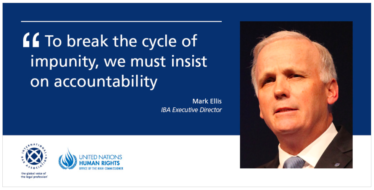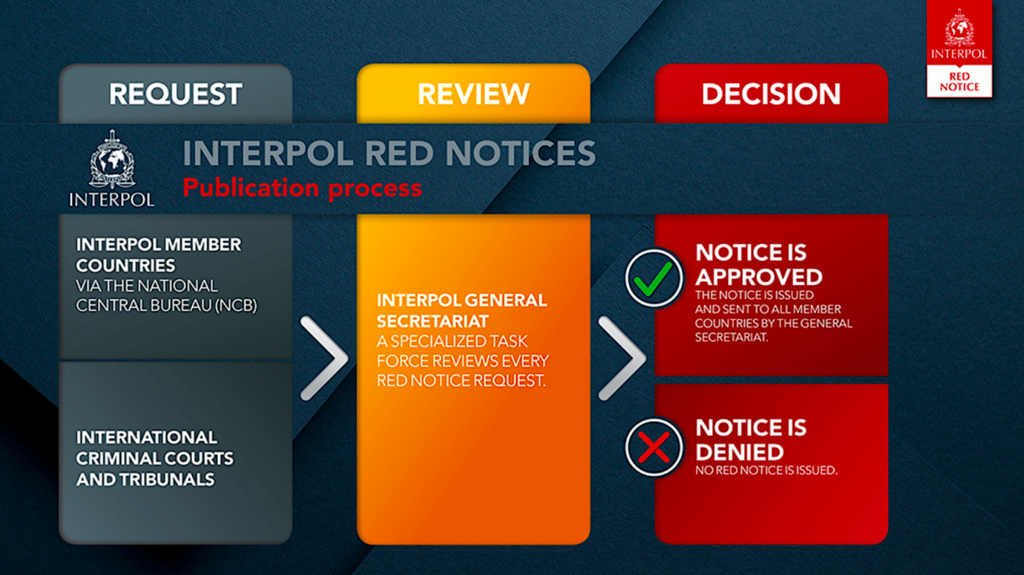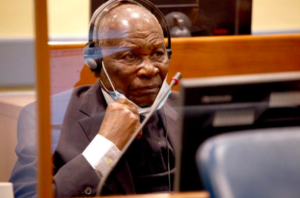© Interpol
How authoritarian regimes are misusing red notices to harass their political enemies abroad
“Come out, come out, wherever you are,” is a line often heard during the children’s game of hide and seek, in which one person – in this case the speaker – is seeking friends who are hiding nearby. It seems to have become a leitmotif for autocratic leaders who fear opposition. Several of them are enlisting the help of law enforcement agencies around the world to help them (albeit unwittingly ) to catch those who got away having dared to question their authority. The method is simple: government officials have taken to using INTERPOL by issuing what are called ‘Red Notices’, which require authorities to trace and arrest the person named and perhaps return them to the country that issued the notice in the event of an extradition request. Often there is no such request; the Red Notice is sometimes used merely to inconvenience and discomfort the subject.
Red notices are only supposed to be issued in cases where a serious violation of the law has occurred; the sort that would be recognised as a crime in any country. To quote the Lexology website, “Red notices are published at the request of a National Central Bureau or an international entity with powers of investigation and prosecution in criminal matters in order to seek the location of a wanted person and his/her detention, arrest, or restriction of movement for the purposes of extradition, surrender, or similar lawful action.” The use of Red Notices to catch and detain political opponents, rather than criminals, is an abuse of the system and it comes in three forms. Firstly, there is political abuse, in which the notice is issued against exiled political activists or asylum seekers. Then there is corruption, says Lexology, which includes the issue of Red Notices as a form of retribution or revenge, whether it relates to personal matters or corporate affairs. It is sometimes used against whistle-blowers. The third form of abuse is where there is a failure to seek extradition, although by issuing a Red Notice it can have an impact on the person it names but without any attempt being made to bring them back to the country that issued the Notice in order to stand trial.

Extract of a Russian red notice posted on the Interpol website.
The notice mention’s :
“Charges
Published as provided by requesting entity
Getting trained for terrorist activity; participation in terrorist organization; participation in illegal armed formation “
The worst offenders, says Lexology, are Russia, China and Turkey, but they are not alone. There have been some 7,000 Red Notices issued, according to data from 2020, of which 2,631 were based on requests from Russia. By comparison, the United States has issued 331 and France just 26. The system has also been abused by, among others, Egypt, Azerbaijan, the United Arab Emirates, Venezuela, Iran, Indonesia and Bahrain. Lexology cites the case of an Egyptian man who escaped torture at home and who sought asylum in Australia, arriving there with his wife and children in 2012. He was detained indefinitely on the basis of a Red Notice issued by INTERPOL at the request of the Egyptian government and he spent five years in detention before the notice was lifted in 2018. It later turned out that the convictions against the man relied on evidence that had been obtained under what was described as ‘severe torture’. The Ancient Romans believed in torture and it was required whenever slaves were questioned, but in these supposedly more enlightened times we have learned that someone undergoing torture will confess to anything, just to stop the pain. When the Templars were tortured, they initially confessed to nothing because they didn’t know what they were being accused of. Once somebody thought to tell them, they confessed to it straight away. They were not guilty, of course, but France’s King Philip IV (‘Philip the Fair’) wanted their riches. However, the case of the detained Egyptian man is just one example; unfortunately, there are hundreds more. The Council of Europe has called for tougher action against the abuse of Red Notices, but the European Union appears not to be listening and often turns a blind eye to Russia’s misdemeanours. The Council’s Parliamentary Assembly (PACE) wants to see more funds being made available to permit INTERPOL to investigate Red Notice requests more fully, but INTERPOL itself stands accused of a lack of transparency and accountability.

The Assembly sees the problem as a human rights issue that should be addressed.A report by Aleksander Pociej adopted in November 2019 sets out the problem clearly. The report, entitled “Abusive use of the Interpol system: the need for more stringent legal safeguards” says that it “has identified a pattern of misuse of the Red Notice system by certain States intent on persecuting political opponents beyond their borders, and addressed a number of concrete recommendations both to member States and to Interpol itself aimed at improving the flow of information and strengthening the filtering and appeals mechanisms at Interpol in order to ensure that abusive requests are less likely to cause damage to the rights of innocent persons in the future.” It’s not the first time the Assembly has come to that conclusion – a similar report was adopted in 2017 – but the main culprits appear unlikely to change their ways any time soon.
RABBITS AND ASSASSINS
Even supposed revolutionaries don’t always get their own way when their home country wants them silenced. Take the example of Lev Davidovich Bronstein, better known to history as Leon Trotsky. He was the only political figure of any stature to stand up to the tyranny of Joseph Stalin, although he was obliged to do it from far away. Stalin was determined to get rid of him because some people still believed that Trotsky’s brand of Communism was purer and closer to the ideals set out by Karl Marx and his collaborator, Friedrich Engels, than those of Stalin himself.

They were right, so Trotsky had to go. He fled abroad from Stalin’s NKVD killers. He was in Norway when the Spanish Civil War broke out and when the Moscow show trials of Lev Kamenev, Grigory Zinoviev and fourteen others began.
They were the closest thing that Stalin’s regime had to a political opposition, but they were charged with high treason, conspiracy and attempting to assassinate Stalin. What’s more, the indictment claimed that it was all part of a terrorist plot led by Trotsky and his son, Lev.
It was all nonsense, of course, dreamed up to justify the arrests and inevitable executions (Stalin is thought to have been responsible for between six and nine million civilian deaths overall; almost as many as Hitler).
Coming up to the present day, the validity of the charges brought against Alexei Anatolievich Navalny for daring to oppose Vladimir Putin have similarly been questioned.
History has a habit of repeating itself when autocratic leaders seek to cement their rule through violence. Back in 1936, the Moscow show trial mentioned the existence of a “Trotskyite-Zinovievite Terror Centre”, which did not exist, but Stalin was not a man to let the truth get in the way of revenge.

On the second day of the trial, Trotsky “offered to submit himself to a Commission on Political Terrorism sponsored by the League of Nations,” according to Joshua Rubinstein’s biography, simply called ‘Leon Trotsky – a revolutionary life’, he was willing “even to accept extradition to Moscow if an independent commission found him guilty of the crimes alleged against him by the Kremlin.” Stalin’s government urged Norway to expel him as a “notorious criminal”, but they never sought extradition because that would mean putting their case before an impartial Norwegian judge who would be likely to spot fraudulent evidence in a vindictive prosecution. The Norwegian government was put under pressure by Stalin and by Germany’s Nazis (they hated Trotsky for being a Communist) and responded by placing Trotsky and his wife under house arrest, where they remained for three months. One of the accusations was that Trotsky and his son had met to plan their conspiracy at the Hotel Bristol in Copenhagen in 1932, apparently unaware that the hotel had been demolished in 1917. No country seemed keen to offer the Trotskys refuge because they were afraid of angering either Stalin or Hitler.

Eventually, persuaded by the artists Diego Rivera and his wife, Frida Kahlo (with whom Trotsky had an affair), Mexico agreed to grant them visas and Trotsky spent his time there trying to fend off the lies and insinuations about his beliefs and policies which were spreading through the United States. The great powers were well into disinformation campaigns, even then. Trotsky knew that Stalin’s NKVD killers were still seeking a way to kill him. It was there, on 20 August, 1940, while he was feeding his rabbits, that he received an unexpected visit from Frank Jacson, the lover of a Trotsky confidante from Brooklyn called Sylvia Ageloff. Suddenly, in Trotsky’s study, Jacson produced an ice pick from under his raincoat and buried the point of it in Trotsky’s head. Much to Ageloff’s surprise, Jacson turned out in reality to be Ramon Mercader, a Spanish Communist recruited to the NKVD during the Spanish Civil War. Trotsky’s assassination had been planned in the Kremlin a long time before. Stalin could not bear the thought of political opposition. Trotsky died in hospital the following day, not far from Jacson, who had been admitted to the same hospital because of a severe beating by Trotsky’s guards. Trotsky pleaded with doctors to keep Jacson alive.
These days, disgruntled Communists seeking the praise of a terrifying leader by killing his opponents may be harder to find, but the basic plan remains much the same: track down those opponents wherever they are in the world and eliminate them, or at least silence them. Stalin’s agents had tried to kill Trotsky less than three months earlier, when they riddled his bedroom door with machine gun bullets but missed the man himself.

More recently, of course, we have seen the murder by poison of Alexander Litvinenko, a former KGB agent (and MI5 double agent) who died three weeks after drinking a cup of tea at a London hotel, unaware that Andrei Lugovoi and Dmitry Kovtun, agents of the NKVD’s modern equivalent, the FSB, had laced it with polonium-210.
Bullets were used to kill Anna Politkovskaya, a Russian journalist who had been critical of Putin, accusing him in her book, ‘Putin’s Russia’ of creating a police state. The press room of the European Parliament in Brussels is named after her.
Another journalist who assisted Politkovskaya, Natalia Estemirova, who had exposed human rights abuses by Russian forces in Chechnya, was abducted outside her flat and later found dead from gunshot wounds in nearby woods.

No-one has ever been charged with her murder. Then there was the attempted murder of Sergei Skripal and his daughter Yulia, using the Russian-developed military nerve agent, Novichok.
Although the Skripals survived – just – the attempt claimed the life of Dawn Sturgess, who unknowingly touched the supposed perfume bottle used to carry the Novichok and carelessly disposed of by the would-be assassins. Her boyfriend, Charlie Rowley, survived, as did the British policeman, Nick Bailey, first called to the scene of the Skripals’ Novichok-induced illness, although they became very ill. The fact that they both recovered has been partially attributed to the British weather at the time: thick fog.
The resulting humidity can weaken the effectiveness of the nerve agent, according to experts. There have been many other victims of violence who had expressed some form of opposition to Putin. It does not seem to be a healthy thing to do.

NO HIDING PLACE
The use of Red Notices, however, means that for dissidents – at least the most important ones – there is literally ‘no hiding place’. It is not supposed to be like that, according to INTERPOL’s own regulations. “A Red Notice must concern a ‘serious ordinary-law crime’ and must not be an offence ‘relating to behavioural or cultural norms,’ ‘relating to family/private matters,’ or ‘originating from a violation of laws or regulations of an administrative nature or deriving from private disputes, unless the criminal activity is aimed at facilitating a serious crime or is suspected of being connected to organized crime’.” If you have ever reported misconduct by a state or queried the honesty of a state leader you must be aware of the risk you are running and the dwindling number of possible places of concealment. “In 2019 alone, INTERPOL issued 13,377 Red Notices,” reports Arnold and Porter, a London based company advising on regulatory, transactional, and litigation issues, “and currently there are approximately 62,000 Red Notices in circulation, roughly 55,000 of which are non-public.” As a result of governments abusing the Red Notice system for improper ends, the International Bar Association (IBA), based in London but with an office in Washington D.C., has raised concerns about the actions of certain countries.

“By submitting a facially valid but illegitimate request for a dissident’s apprehension and extradition, they are then able to accomplish in United States immigration proceedings what they could not do under the scrutiny of formal extradition proceedings. In turn, US immigration practitioners are increasingly confronted by such persecutory Red Notices, whether in court, when their client is arrested at their house or at a US Citizenship and Immigration Services interview.” In its conclusions, the IBA seems unconvinced that INTERPOL is sufficiently neutral when Red Notices are served, at least in the United States. “Interpol communications are far too often used as conclusive evidence of criminality by US immigration authorities, upending the lives of foreign nationals who are legitimately seeking asylum and other benefits. In order to effectively advocate for these clients, and stand against transnational repression, immigration attorneys must familiarise themselves with how Interpol functions, and learn how to successfully challenge persecutory Red Notices and diffusions.”
London-based lawyers Corker Binning have been involved in a number of such cases and have warned of the dangers posed by Red Notices, even to the wholly innocent. “The practical and reputational impact of an extant Interpol Red Notice is far-reaching,” they warn. “It can render individuals virtual prisoners in their country of residence. It may lead to the closure of bank accounts due to anti-money laundering laws. Regulated persons, for example by the FCA (Financial Conduct Authority), will need to make appropriate disclosures.

Knowing how to respond to and challenge an Interpol Red Notice is therefore as important as knowing how to respond to and challenge a domestic arrest warrant.” In all, even if the country requesting the issuance of a Red Notice has no intention – nor the capability – of extraditing the person named, they can thoroughly mess up someone’s life.
The US authorities have taken to standing up to Red Notices; they have dismissed eight alerts issued by Russia for Bill Browder, an American-born British financier and political activist who is the CEO and co-founder of Hermitage Capital Management. That’s the investment advisor to the Hermitage Fund, at one time the largest foreign portfolio investor in Russia. Browder’s lawyer in Moscow, Sergei Magnitsky, named three state officials who had tried to steal Hermitage Fund property. They had him arrested and sent to prison, where he was severely beaten and denied medical help. He died. At an event to commemorate the 50th anniversary of the opening by Interpol of an office in Washington, Edward O’Callaghan, a senior official at the US Justice Department, said “We cannot allow INTERPOL to be weaponised against journalists, dissenting voices and oppressed minorities.”

INTERPOL likes to stick to the rules and honour requests made to it by member states but there are limits. Following the failed 2016 coup attempt in Turkey, Ankara submitted requests for tens of thousands of Red Notices. INTERPOL chose to set them aside, but many authorities seem to accept a Red Notice as evidence of criminality in itself, locking up the individual concerned and freezing their bank accounts just in case. According to US immigration attorney Sandra Grossman, America’s Immigration and Customs Enforcement officials too often treat a Red Notice as proof of guilt. One of her clients, who is Chinese, has spent months locked up in a detention centre, with the judge refusing to issue him with a bail bond solely because of the Red Notice. Beijing must be happy about that.
BUMBLE WAS RIGHT: “THE LAW IS A ASS” (Yes, that’s how Charles Dickens wrote it)
“It should be noted from the outset that the reform process at INTERPOL, accompanied by the Assembly’s earlier work, has indeed prompted the introduction of stronger compliance checks for Red Notice requests,” wrote Polish MP Aleksander Pociej, in his report to the Council of Europe Parliamentary Assembly. “Certain governments have reacted by using ‘Wanted Person Diffusions’ instead. These involve the selective distribution, through Interpol’s channels, of bilateral or multilateral requests for apprehending a targeted person. Whilst Resolution 2161 (2017) (‘Abusive recourse to the Interpol system: the need for more stringent legal safeguards’) only referred to Red Notices, it is clear that such ‘Diffusions’ must also be subjected to compliance checks. I was told that this is indeed the case now, although the sheer number and urgent nature of diffusions are challenging.” Want to hide a fraudulent Red Notice request? Issue it among dozens of genuine ones. After all, we must always remember that INTERPOL is not a police force, merely an organisation that facilitates law enforcement cooperation among its 194 member states. There may be safety in numbers, as the old saying goes, but there is also the ability to hide dishonesty and corruption in a crowd.

The campaign group Fair Trials is pleased with the Parliamentary Assembly’s involvement in trying to stop abuse of the Red Notice system. “As INTERPOL is an important tool for tackling cross-border crime,” it writes on its website, “PACE recommended the organisation to further improve its transparency by disclosing data that would help to assess how effective its review mechanisms are. Among PACE’s recommendations are also the improvement of its systems for scrutinising and preventing repetitive requests; better control of the information that flows through its communication system and ends up on national databases; and a strengthened appeals procedure that would make recourse speedier, more interactive and transparent.”
As Pociej wrote in his report for PACE: “International co-operation in the field of criminal law is of fundamental importance. When criminals take advantage of reduced border controls in Europe to escape justice in their own countries and transfer criminal assets abroad, States must react by co-operating with each other efficiently to uphold the rule of law. A reasonable balance must be struck between the legitimate interest in preventing impunity for serious crimes, which themselves violate human rights, and the rights of the person targeted by an extradition request, who must not be exposed to a serious risk of flagrant denial of justice, cruel and inhuman punishment and/or discriminatory treatment on political, racial, ethnic or religious grounds. International co-operation in the field of criminal law requires a high degree of mutual trust, based on common standards and practices. Trust is destroyed when international co-operation mechanisms are misused for political or corrupt purposes.” A high degree of mutual trust is not something you get with a flagrantly misused Red Notice.

Of course, most Red Notices are issued to apprehend genuine criminals, like the twin brothers who broke into the Green Vault Museum in Dresden, Germany, and stole a large quantity of precious 18th century jewellery in 2019. Shortly after the notice was issued, there was an arrest. In early 2020, a man wanted in connection with the 1994 genocide in Rwanda, and the subject of an INTERPOL Red Notice, was arrested by French police. 84-year-old Félicien Kabuga, indicted by the International Criminal Tribunal for Rwanda (ICTR) on seven counts including genocide, conspiracy to commit genocide, persecution and extermination, was taken into custody in a village near Paris where he had been living under a false identity. In another case, a rapist and murderer was arrested in Buenos Aires, Argentina, after 26 years on the run, thanks to an INTERPOL Red Notice. Back in 1994, Nancy Mestre Vargas went to a New Year’s Eve party in Barranquilla, Colombia, but failed to return home. Her killer was captured in the Brazilian city of Belo Horizonte, where he had been living under a false identity. Jaime Saade Cormane had been on the run ever since he raped and murdered Vargas.


He was one of several wanted persons targeted by INTERPOL’s Fugitive Investigative Support (FIS) unit as part of Project El PAcCTO (Europe-Latin America Assistance Programme against Transnational Organized Crime). In another case, Brazilian Federal Police caught a Turkish fugitive who had been convicted of smuggling migrants to the United Kingdom from Belgium. In November 2017, the fugitive, identified only by his initials, VK, was sentenced by a Belgian court to eight years in prison for his involvement in an international smuggling ring. The group targeted migrants of Syrian nationality and charged hefty fees to organize their illegal travel to the UK by sailing boat, carrying men, women and children in a perilous manner. He escaped before serving his sentence and had been on the run from Belgian authorities since 2018. INTERPOL’s National Central Bureau (NCB) in Brazil traced him to Sao Paolo. When they discovered he was due to fly out of the country two days later, they turned to INTERPOL to obtain additional information as well as a Red Notice against the fugitive.
INTERPOL can be proud of its record in bringing serious international criminals to justice by means of Red Notices. The blame for the system’s occasional misuse lies completely at the feet of authoritarian regimes that seem to have very strange ideas of justice. INTERPOL does try to filter out malicious requests for a Red Notice, as it explains on its own website: “Every Red Notice request is checked by a specialised task force to ensure it is compliant with our rules. This review takes into account information available at the time of publication. Whenever new and relevant information is brought to the attention of the General Secretariat after a Red Notice has been issued, the task force re-examines the case.” Of course, the country making the request can (and often does) supply misleading data to back up their case, although it may not always lead to an arrest. “INTERPOL cannot compel the law enforcement authorities in any country to arrest someone who is the subject of a Red Notice,” says its website. “Each member country decides what legal value it gives to a Red Notice and the authority of their law enforcement officers to make arrests.” INTERPOL is not always able to find out if those data are false. “Data means any item of information, irrespective of its source, pertaining to constituent elements of ordinary-law crimes,” says the website, “the investigation and prevention of such crimes, the prosecution of the offenders and punishment of the offences, and any information pertaining to missing persons and unidentified dead bodies.”
THE LAW AS A MEANS TO STEAL
It is not just rogue states, however, that abuse the Red Notice system. It can also be employed as a means of silencing a business rival.

Juriy Nemets, writing on the Red Notice Abuse Reports website, says “I am often contacted by entrepreneurs with Red Notices and Diffusions published at the request of or disseminated by countries where illegal business takeovers are common. Such takeovers are usually characterised by criminal conduct by a party attempting to force a business owner to surrender his/her rights or interest in the business against the latter’s will by means of force, threats and/or extortion and accompanied by trumped up charges against the victim brought by corrupt government officials in aid of the takeover if the victim refuses to comply.” The Commission for the Control of INTERPOL’s files (CCF) has in the past highlighted what it calls “politically motivated prosecutions” of “particularly influential businessmen”. The CCF is an independent, impartial body, responsible for ensuring that the processing of personal data complies with applicable Interpol rules. Many autocratic regimes have friendly oligarchs who may need assistance to steal a rival company and the misuse of Red Notices provides a way.

The Law Society in the UK mentions that British governments have tended to ignore Red Notices without arresting the individuals named. “The reason for this stance is well-known and long-established: Interpol cannot be trusted. Its processes are open to grave abuse by countries with a questionable commitment to, or even open contempt for, the rule of law. Red Notices are routinely issued for political or other improper purposes, based on flimsy or non-existent evidence. While an individual can challenge a Red Notice, this is often after the event and the process is opaque and can take 12 months or more.”
The problem was mentioned during the passage of a bill through the UK Parliament, although a requirement for countries to state their opposition to Red Notice abuse was dropped. The Law Society ponders the answer: “So, if Interpol cannot be trusted to weed out unmeritorious and abusive Red Notices, we must assess the trustworthiness of the issuing country instead.”

The misuse of Red Notices and of INTERPOL itself by a member nation for predominantly political, military, racial or religious reasons is expressly forbidden in INTERPOL’s constitution. But, as the International Bar Association (IBA) attests, it still happens, all too often, it seems. “Governments, international organisations, non-governmental organisations and experts have attested to the reality of Interpol abuse. Immigration attorneys also witness first-hand the damage that a Red Notice can do to an innocent client who is processing a visa, a green card, a naturalisation case or an asylum case, among other applications for immigration benefits.” In other words, you can escape the jurisdiction of one country and its laws, but you may find its powers to interfere in your life and severely inconvenience you can be extended to any country you care to mention, thanks to INTERPOL and its Red Notice system. It’s an issue that seems to be ignored by some countries, although the IBA has announced some progress. “In 2019, the congressional Commission on Security and Cooperation in Europe, also known as the Helsinki Commission, introduced the Transnational Repression Accountability and Prevention (TRAP) Act to address Interpol abuse at an international level and the misuse of its communications by US authorities. The TRAP act would enhance the screening process for Interpol communications to ensure they do not violate Interpol’s constitution or rules for data processing. It would also seek to obtain more transparency and accountability at the CCF by requiring countries found to be in violation of the agency’s rules to seek prior approval before submitting any further complaints about the same individual and would impose penalties for egregious abuse.”
Don’t expect autocratic regimes whose leaders fear being overthrown to take too much notice. There are always ways around regulations if you look hard enough. The Red Notice system itself is too valuable in seeking out real criminals ever to be set aside completely. As the 14th century poet and writer Christine de Pizan wrote in her 1399 ‘Letter of the God of Love’: “Those who plead their cause in the absence of an opponent can invent to their heart’s content, can pontificate without taking into account the opposite point of view and keep the best arguments for themselves, for aggressors are always quick to attack those who have no means of defence.” It seems that the rich and powerful haven’t changed much in the last 600 years.

